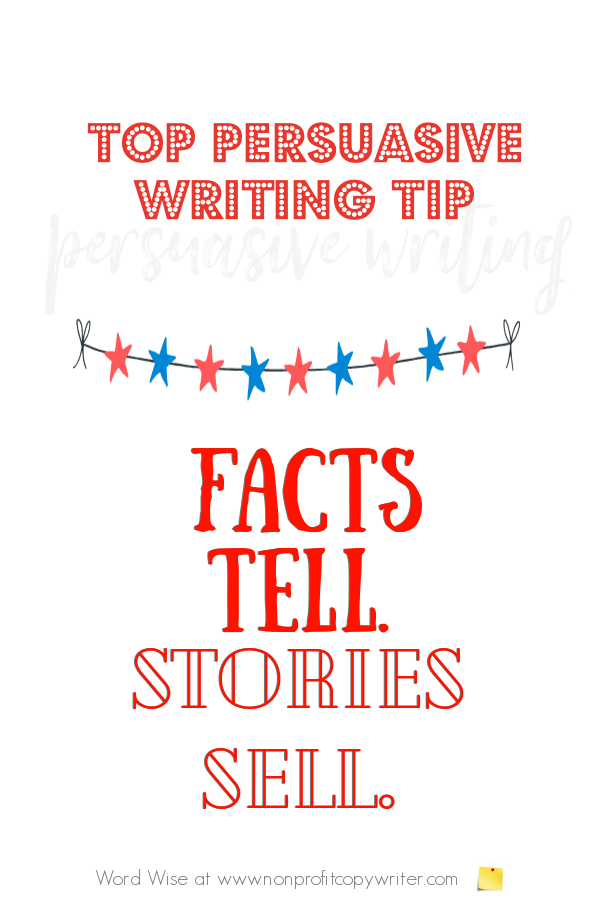Save Time: Get 5 Simple Writing Tips
you can put to use in 10 minutes
Want To Persuade? Just The Facts Ain't Enough
Award-winning writer Kathy Widenhouse has helped hundreds of nonprofits and writers produce successful content , with 750K+ views for her writing tutorials. She is the author of 9 books. See more of Kathy’s content here.
Posted 5.3.24
Facts and stories. To write persuasively, you need both.
Early in my writing life, I worked with a new client who had two dueling personalities on his creative team. One staffer wanted factual content only. The other insisted that every piece of content open with a heart-wrenching story.
“Our most recent stats are powerful,” explained the team member who was grounded in practicality and common sense. “Readers want to know that the problem is tangible. Numbers show that.”
“But readers want to understand people on a deeper level,” argued the passionate member of the group. “And we want them to feel the heartache and triumph these folks face.”
Naturally, I was caught in the middle of a civil war. Who was right? It turns out both were.
It’s not that stories are better because they stimulate a reader’s emotions, I explained. True, all those yummy feelings engage hearts and persuade readers to act. On the other hand, facts don’t have the upper hand simply because they appeal to logic and prevent reader’s remorse. A slide deck with carefully curated data doesn’t get a reader’s blood pumping through his veins.
Both facts and stories are powerful persuasive techniques. If you’re writing to persuade, just the facts alone won’t cut it. Nor does an emotion-laced sob story that flies solo. There’s a clear reason why facts and stories work best together: the reader’s memory.

Just the facts — by themselves — are hard to remember
Legal cases are won by facts. Res ipsa loquitur — Latin for “the thing speaks for itself” — is a common law doctrine that roughly translates to mean, “The data clearly shows the truth.” It’s a principle that can be traced back to Roman statesman Cicero (106 BC- 43 BC) in a defense speech.
Centuries later, Sergeant Joe Friday helped propel the television show Dragnet (1951–59) to fame with a famous catchphrase, “Just the facts, ma’am.” His interrogation technique helped cut to the heart of the matter and solve case after case.
While “just the facts” may work at the police station and in the courtroom, that’s not the case in readers’ minds.
Look at the entertainment industry. Adventure, action, and drama films — story-driven flicks — take in a combined 66.37% of the movie market share. Documentaries, on the other hand, present the facts. They net a mere 0.92%.
But you may struggle to recall those numbers once you finish reading this article. That memory loss poses a worrisome question for writers. Will readers remember what you write? It’s especially perturbing when writing to persuade since your goal is to move readers to take action once they turn the page or click off the site.
Wrap the facts in a story
Researchers offer good news for writers. Harvard Business School’s Thomas Graeber and his colleagues discovered that facts are best remembered in the context of a story.
In their 2022 study, about 1,000 participants were asked to look at product reviews and determine if the review was positive. Before reading the review, the participant was given a bit of extra information about the product — either a statistic, a story, or nothing of significance. Graeber and his team wanted to learn which pieces of information the participants remembered best: statistics or stories.
Each participant was tested immediately after receiving the extra piece of information and again a day later. The researchers discovered a gap in participants’ memories. Extra statistics given just before reading the reviews stayed with the subjects just 27 percent of the time — about once in four tries. But two out of three times, stories stuck.
There’s a reason for that. High emotion triggers oxytocin in our brains, says neuroscientist Paul J. Zak. That’s the neurochemical often referred to as the “love hormone” because it builds bonding, trust, empathy, and compassion. You could say that a story that elicits strong feelings acts like a drug on your reader.
Don’t let the facts speak for themselves
“Effective content marketing is about mastering the art of storytelling,” says digital marketing pioneer Bryan Eisenberg. “Facts tell, but stories sell.”
I saw this truth play out with my clashing team members who battled over facts and stories. When I described a campaign I had completed that yielded a 48% response, the facts-oriented staffer’s eyes lit up. “But the content opened with the story of a teenage boy in poverty who didn’t have a sweater — and needed one,” I explained. Naturally, the bleeding-heart staffer swooned. But in the end, they were both convinced that stories and facts together were the best content solution.
Bottom line: the most persuasive content is a concrete fact wrapped in a luscious story. Pair them together and you’ll give your content a one-two punch readers can remember.
And when someone says, “Just let the facts speak for themselves,” don’t believe them.
If you want to persuade, that is.
More Persuasive Writing Tips
10 Kinds of Facts That Persuade ...
Persuasive Writing Techniques: Give factual proof ...
Persuasive Writing Techniques: Tell a good story ...
Persuasive Writing Techniques: Raise and Refute Your Reader's Objections...
How to write persuasive stories ...
Pillars that Persuade: Understand the 3 Persuasive Writing Basics ...
More persuasive writing tips on our Pinterest board ...
As an Amazon Associate I earn from qualifying purchases.
Share This Page

Named to 2022 Writer's Digest list
BEST GENRE/NICHE WRITING WEBSITE


Stop Wasting Time!
Grab your exclusive FREE guide, "5 Simple Writing Tips You Can Put to Use in 10 Minutes or Less"











